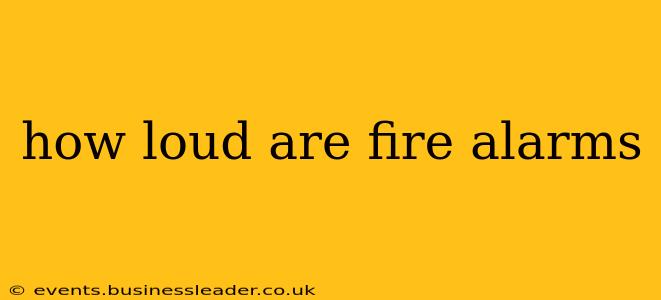How Loud Are Fire Alarms? A Deep Dive into Decibel Levels and Regulations
Fire alarms are designed to be loud enough to wake you from a deep sleep and alert you to a potential fire hazard, even if you're hard of hearing or have other auditory impairments. But just how loud are they, and what factors influence their decibel level? Let's explore.
Standard Decibel Levels:
Most standard fire alarms emit a sound between 85 and 110 decibels (dB). To put that into perspective:
- 85 dB: This is roughly equivalent to the sound of heavy city traffic. While audible, it might not be jarring enough to immediately rouse someone from a deep sleep.
- 110 dB: This is comparable to the sound of a nearby jackhammer or a rock concert. At this level, the sound is undeniably loud and attention-grabbing.
It's important to note that these are average ranges. The specific decibel level of a fire alarm can vary depending on several factors, which we'll discuss below.
What Factors Affect Fire Alarm Loudness?
Several factors can influence the decibel output of a fire alarm:
1. Type of Alarm: Different types of fire alarms have different sound levels. For instance, ionization smoke alarms may have slightly different sound profiles than photoelectric smoke alarms, though the overall dB range often remains similar. Horn-strobe alarms, designed for use by those with hearing impairments, combine a loud audible alarm with a highly visible strobe light.
2. Distance from the Alarm: The further you are from the alarm, the quieter it will sound. Sound intensity decreases with distance, following an inverse square law. This means that doubling the distance reduces the sound intensity to one-fourth.
3. Environmental Factors: Background noise significantly affects the perceived loudness of a fire alarm. A noisy environment will require a louder alarm to be easily heard.
4. Age and Condition of the Alarm: Over time, the components of a fire alarm can degrade, potentially reducing its sound output. Regular testing and maintenance are crucial to ensure the alarm is functioning correctly and at its intended volume.
5. Alarm Placement: The placement of the alarm affects the sound distribution. Alarms located in corners or near reflective surfaces may produce slightly higher sound levels in certain areas compared to those positioned in open spaces.
Are Fire Alarms Loud Enough?
While most fire alarms are designed to be loud enough to effectively alert occupants, their effectiveness depends on various factors discussed above. Individuals with hearing impairments may require additional alerting systems, such as bed shakers or flashing lights, to ensure they are adequately warned in case of a fire.
How Often Should I Test My Fire Alarms?
It's crucial to test your fire alarms regularly – at least monthly – to ensure they are functioning correctly and producing a sufficiently loud sound. This simple check can significantly increase your safety and peace of mind. Familiarize yourself with the testing procedures outlined in your alarm's manual.
What to Do If Your Fire Alarm Isn't Loud Enough?
If you find your fire alarm isn't loud enough or seems to be malfunctioning, replace it immediately. Don't rely on a faulty alarm for your safety. Choose a new alarm that meets current safety standards and consider installing additional alarms in strategic locations throughout your home. For homes with multiple stories, ensuring coverage on each level is vital.
By understanding the factors that influence fire alarm loudness and taking proactive steps to maintain and test your alarms, you can significantly enhance your home fire safety. Remember, early warning is critical in preventing serious injury and property damage.
